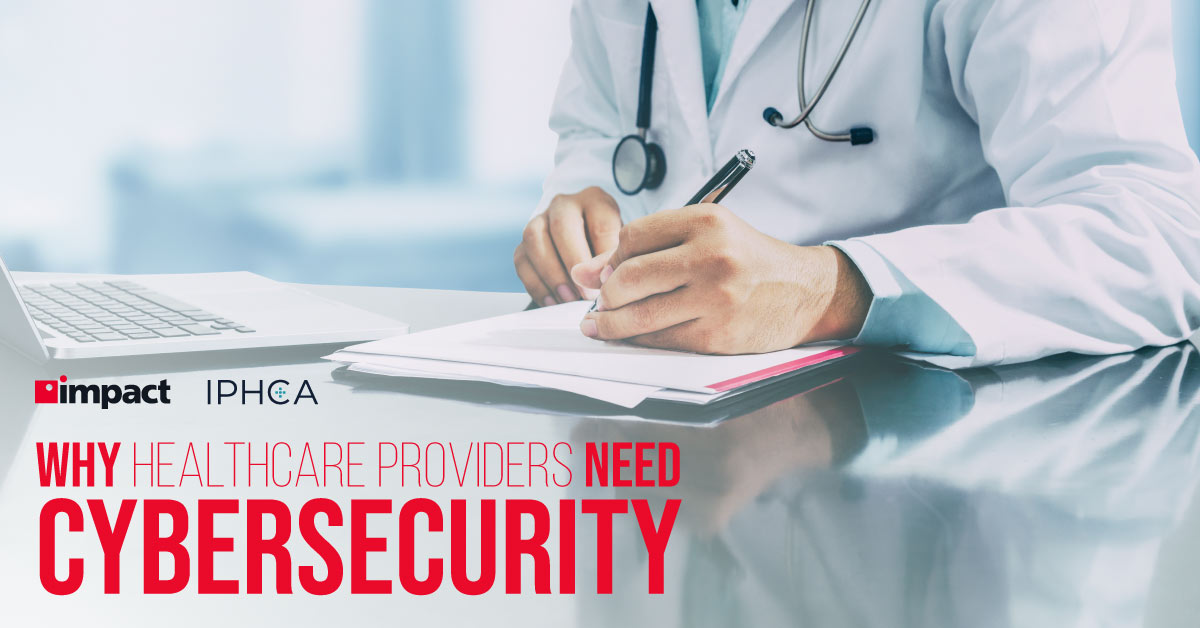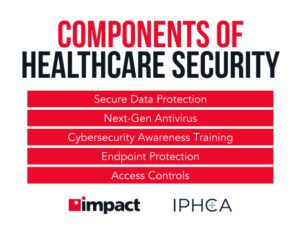Why Healthcare Providers Need Cybersecurity
Written by Impact

Why Healthcare Providers Need Cybersecurity
Due to the nature of the industry, healthcare organizations are under constant threat from cyberattacks and hackers who seek to steal information for profit, personal gain, blackmail, or other nefarious plans.
For these reasons, securing a healthcare organization can be complex and involve many unique security tools and strategies. There are a lot of things to consider when building a security strategy from the crucially important task of protecting health information to securing devices and equipment that are connected to the network.
Read on to learn more about what healthcare businesses can do to establish a strong cybersecurity culture to protect themselves and their patients.
Key Components of a Cybersecurity Strategy
First, let’s look at some of the key components that make up a strong security foundation and how they help keep providers secure:
- Secure Data Protection: In healthcare, sensitive data is constantly being collected, stored, and transferred. Data security uses security tools like encryption to protect data on the move from falling into hands.
- Next-Gen Antivirus Software: With so much data coming into a healthcare business’ network, you can’t possibly rely on humans to scan it all and seek out every bit of malicious activity. That’s why it’s important to have the most up-to-date anti-virus software available that sifts through everything that comes in, scanning it for viruses, malware, phishing scams, and more.
- Endpoint Protection: Hospitals and practices are full of network-connected healthcare devices. Even the most rudimentary machines can act as a gateway for hackers. Ensure all devices, equipment, and individual systems are secured against outside threats.
- Awareness Training: One of the strongest defenses a business can have is a trained and security aware staff. With frequent training on the latest trends in cyberattacks, healthcare employees can more easily spot suspicious behavior and report it, avoiding social engineering scams like phishing that are looking to expose login credentials and other information.
- Access Controls: With so much sensitive data being stored, it’s important that businesses limit who has access to it by only authorizing users who need it. Additionally, be sure to change passwords frequently and make use of innovative multi-factor authentication tools—including passwordless authentication—for an added layer of security.
The Importance of HIPAA Compliance and Data Security in Healthcare
One of the most important reasons healthcare businesses need a strong cybersecurity posture is to maintain compliance with HIPAA. Security measures like access control, awareness training, data security, and data encryption all work together to secure electronic protected health information (ePHI) and meet the standards set by the regulations.
Maintaining HIPAA compliance is important for many reasons, including:
- Preserving Patient Trust: Keeping patient’s health data secure and avoiding data leaks helps build trust between providers and patients. More trust leads to better care and stronger relationships between patients and their doctors.
- Avoiding Hefty Fines: One obvious benefit of maintaining HIPAA compliance is avoiding sanctions and fines for noncompliance which can range from hundreds to hundreds of thousands of dollars.
- Better Patient Experience: A higher level of trust between a practice and its patients leads to better care, improved experiences, higher internal morale, and more.
Learn More About Healthcare Cybersecurity
If you want to learn more about cybersecurity best practices for securing your business, explore the blogs, infographics, videos, and more found in our Resource Center.


